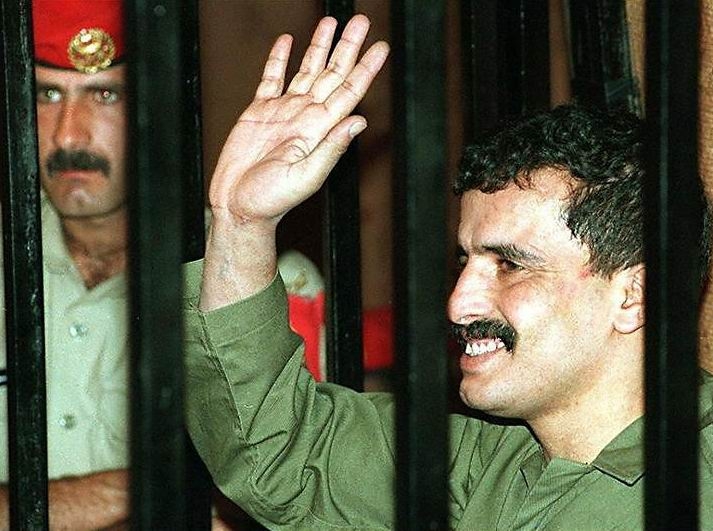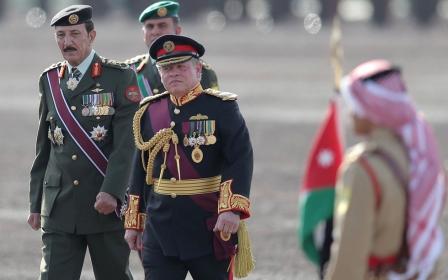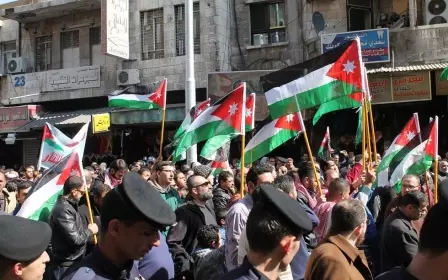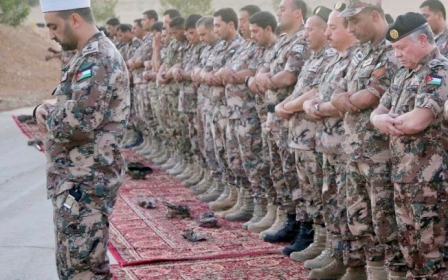Jordanian killer of Israeli girls released to hero's welcome

A Jordanian soldier who killed seven Israeli schoolgirls in 1997 was released from prison to a hero's welcome on Sunday after serving a 20-year sentence.
Ahmed al-Daqamseh was working as a soldier when he opened fire on a group of girls aged 13 and 14 who were visiting the Israel-Jordan border on a school trip, in what has since become known as the Island of Peace Massacre after the site where it was committed.
Following the attack, the Jordanian army declared that Daqamseh suffered from antisocial personality disorder. As a result, he did not face the death penalty but was sentenced to 20 years in prison.
He was released early Sunday after serving the full sentence. There had been numerous calls for his early release; in 2013, 110 out of 120 members of the Jordanian parliament signed a petition calling for him to be pardoned.
Dakamseh told Jordanian media on Sunday that he was "against any destabilisation in the country," but that his opinion of Israelis had not changed.
"As for my position on the Zionists, you all know... what I did 20 years ago," he said.
Footage shot early on Sunday, a day before the 20th anniversary of the massacre, showed Daqamseh being driven slowly through crowds chanting and clapping to show their support.
Jordan’s Roya television channel broadcast footage of him held aloft by a crowd in his home town of Irbid in northern Jordan, next to a poster describing him as a "hero".
Daqamseh was reportedly released early in the morning to prevent more widespread scenes of celebration, which could raise tensions with Israel.
At the time of the shooting, Jordan's King Hussein travelled to Israel to give his condolences to the families of the shot schoolgirls, telling the then (and present) prime minister, Benjamin Netanyahu: "I feel as if I have lost a child of my own."
Hundreds of Jordanian soldiers reportedly lined up to donate blood at the hospital in Amman where the seven other children also injured in the attack were taken for treatment.
There was no immediate reaction from the Israeli government to news of Daqamseh's release.
In 2011, Israel summoned the Jordanian ambassador after Jordan's then justice minister, the veteran opposition figure Hussein Mjalli, sparked a diplomatic row when he joined protests calling for Daqamseh's early release, dubbing him a "hero".
On Sunday, the father of one of the schoolgirls killed in the attack told Israel Radio that he had been informed last week of Daqamseh's imminent release by the Israeli embassy in Jordan.
"It is unfortunate, but this is the situation," Yisrael Fatihi said.
Hezi Cohen, whose daughter Nirit was shot dead in the 1997 attack, said the morning "takes us back 20 years, to that horrible day".
"I'd like to tell the [Israeli] prime minister and defence minister: our children's blood should not be worthless," he told Israeli news website Ynet.
"You should have acted vis-a-vis Jordan to prevent this release at any cost."
New MEE newsletter: Jerusalem Dispatch
Sign up to get the latest insights and analysis on Israel-Palestine, alongside Turkey Unpacked and other MEE newsletters
Middle East Eye delivers independent and unrivalled coverage and analysis of the Middle East, North Africa and beyond. To learn more about republishing this content and the associated fees, please fill out this form. More about MEE can be found here.




